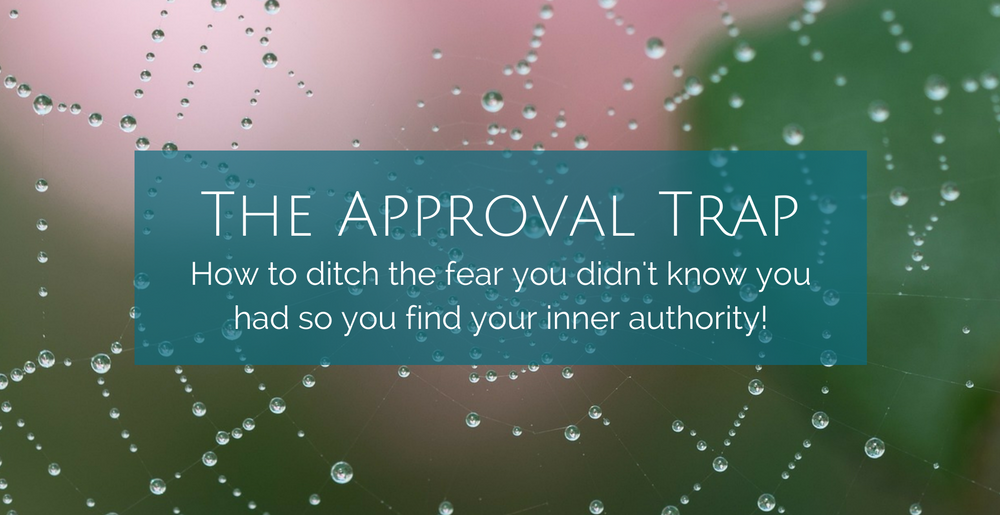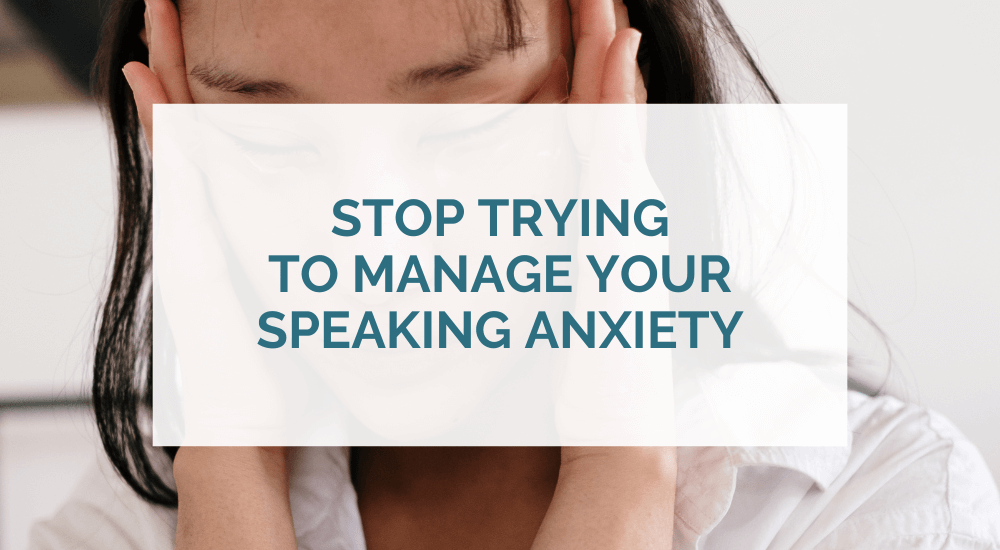
When my daughter was 2 years old, she loved to draw. The funny thing is, she never asked me if it was okay to draw on the walls. She assumed it was fine. White wall, colorful crayons, good idea.
She had inner authority: she didn’t stress about it; she knew just what she liked. She never second guessed herself, wondering if she was good enough. She certainly didn’t wonder if she was smart enough, attractive enough, or funny enough. She assumed that she was all of these things and more, and most importantly, she was undeterred in accomplishing whatever she set her mind to.
Is that just like you? If so, I’m truly thrilled for you. But I suspect that for the majority of us, this magnitude of inner confidence got whittled away bit by bit over the years — by school, peers, mentors, and even members of our families.
How we get caught in the Approval Trap: Our families
 We all come into the world with this amazing creative sense of expressivity and rightness. We are unruly, make noise, make demands. Too often, though, it seems that the world doesn’t know how to deal with this. Our parents need us to be a certain way so that they can get their work done and so that we reflect well on them. We are asked to curb our desires to make room for others, to cooperate with other people’s needs.
We all come into the world with this amazing creative sense of expressivity and rightness. We are unruly, make noise, make demands. Too often, though, it seems that the world doesn’t know how to deal with this. Our parents need us to be a certain way so that they can get their work done and so that we reflect well on them. We are asked to curb our desires to make room for others, to cooperate with other people’s needs.
Indeed, perhaps we are met with this kind of disapproval because our freedom reminds our caretakers of what they lack, what they fear, or what they simply don’t understand.
As children, we are dependent on our caretakers for survival, and so we bend to their rules. Especially as girls and women, in order to stay on the good side of our caretakers and teachers, we have to conform to the behavior that they expect from us.
In my case, I grew up with a lot of yelling and witnessing my two older sisters getting their mouths washed out with soap as punishment for being “fresh” with my parents. There was always an escalation of demands that my sisters resisted, and this would typically result in some physical reprimand.
Terrified by the looming threat of these punishments, I vowed that I would never do anything to make someone yell at me this way. Thus began my entry into goody-goodness, of ensuring that my actions would bring approval from my parents and my sisters (though, to be honest, the latter was a lost cause).
How the Approval Trap is embedded in our school system
Of course, there are always exceptions, but the last time I looked, our public school system rewards those who follow the rules and particularly those who can easily figure out what the teacher wants and to behave exactly in line with their expectations. We aren’t taught to think outside the box or come up with our own ways of doing something, and certainly not to choose what is worthy of our time to study.
 Not surprisingly, I was a pro at figuring out what the teacher wanted — something that gained the approval of my teachers, but not so much that of my peers. Again, it seems that girls in particular have been the ones who particularly excel at reading the teacher in this way, and tailoring their behavior in response.
Not surprisingly, I was a pro at figuring out what the teacher wanted — something that gained the approval of my teachers, but not so much that of my peers. Again, it seems that girls in particular have been the ones who particularly excel at reading the teacher in this way, and tailoring their behavior in response.
Not everyone capitulates to these rules — tedious, pointless classics such as having points demoted for writing your name on the left instead of the right side of the page. Though kids who defy these standards are typically punished, it’s likely that they fare better in later years when out in the “real world”.
You see, in the world of the workplace and particularly in entrepreneurship, it is innovation—not blind obedience—that leads; it’s all about the unusual, the fresh, the new way that hasn’t been done before as opposed to the “that’s the way it’s always been done” attitude of our schooling system.
But even the most rule-defying of us have been affected by the approval trap in school, where we are rewarded with approval for following the status quo instead of thinking for ourselves and expressing our innate creativity. Now that we’ve long graduated from high school, though, it’s exactly this kind of approval-seeking that can grind us to a halt as entrepreneurs.
How the approval trap paralyzes us as women entrepreneurs
Let’s connect the dots here. Let’s say, you’re a yoga teacher and you want to create meditation audios. So you create some recordings that you’ve used before with success. Then, you decide you want to be a little more creative and do something you haven’t tested.
But all of a sudden, you start procrastinating. You just don’t seem to be able to make yourself do it. It gets pushed to the side over and over.
You see other people putting audios out, and you start to feel ashamed that you just can’t get it together.
What’s going on here?
Again, this is the approval trap in action. It’s very likely that your procrastination is due to an inner critic that wonders, “What if people don’t like it? What if they think it’s weird? What if they leave my list?” And because you are so worried about getting approval from others, you feel you can’t make a move. You are trapped.
Here is another example. Suppose you’ve been considering making some video tips to share with your audience. Again, you think and think about it but it doesn’t ever happen. You have a tug-of-war going on inside: one part of you really wants to go on camera, and the other is that inner critic again, saying, “I don’t know if I’m good enough; I’m not an expert; I don’t even know what to say….”
It’s the same story of fearing what others will think, of wanting to ensure their approval.
The shame of it is that seeking approval creates stress that holds us back from getting traction in our work. This hinders us from accessing our full capacity to think originally and make the greatest impact possible, to distinguish ourselves from the crowd of similar service providers, and establish ourselves as thought leaders in our field.
The approval trap keeps us from making our most meaningful contribution by keeping us confined to our comfort zone. Click To TweetSo how do we get beyond this need for approval from the outside and instead, claim our inner authority — like we did when we were children?
Here are five suggestions to get you started.
- Don’t try to please everybody. You know best what you want to do for yourself and your business.
- Allow others to disagree with you. Don’t feel hurt or insecure: acknowledge that your unique perspective is a valuable contribution to the conversation.
- Let go of wanting to be liked by everyone. That’s a losing battle: it’s not going to happen anyway, so don’t waste your time on it.
- Give yourself permission to make mistakes. We learn as much (or more) from our mistakes than from our successes.
- Own your beliefs and opinions. It’s safe for you to have your own point of view.
 When you’re finally able to escape from the approval trap, you’ll reconnect with your inner authority — that takes action on your good ideas, that doesn’t need to ask for permission, that doesn’t question if you’re “good enough.” Following your inner authority clears the way for massive acceleration and growth — for both you and your business.
When you’re finally able to escape from the approval trap, you’ll reconnect with your inner authority — that takes action on your good ideas, that doesn’t need to ask for permission, that doesn’t question if you’re “good enough.” Following your inner authority clears the way for massive acceleration and growth — for both you and your business.
Imagine having the unconcerned freedom that you had when you were a child, before you fell into the approval trap.
What is waiting for you on the other side?






I love the example of a child colouring on the walls like it’s the most natural thing to do.
I am not a fan of criticism and the wee child with crayons may be surprised if stopped. I will continue to beat to my own drum in my business or otherwise. Thanks for your thoughts!
Yes, Elizabeth, it could be dangerous. It could be that some people would be annoyed by us. It could be that others are inspired by us or grateful that we spoke up about something. It could also feel dangerous if there were incidents in our past where we were reprimanded and hurt or traumatized. Then the idea of speaking up would definitely feel scary! It was for me.
As I enter the last third of my life, I think, I’ve been the way I have for decades, let’s see what it’s like to do it differently. I’m not any less nice, in fact, I’m probably more loving and supportive. And curious, what happens when I state my opinions, speak my mind unapologetically?
I’m still brainwashed enough to wonder of this kind of thinking is somehow “dangerous!” So much was set up as dangerous….even, or especially(!) where I often speak in public: at my interfaith CHURCH! It’s a challenge to unlearn the old rules. And one must learn to heed, hoard, and absorb the available messages of support. Thanks!